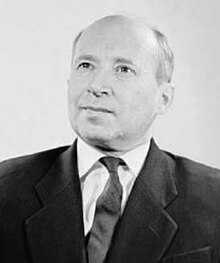Israel Gelfand
Israïl Moiseevich Gelfand | |
|---|---|
 | |
| Born | September 2, 1913 |
| Died | October 5, 2009 Highland Park, New Jersey |
| Nationality | |
| Alma mater | Moscow State University |
| Known for | Group Theory, Representation Theory, mathematical analysis |
| Awards | Order of Lenin (three times) Wolf Prize (1978) AMS Steele Prize (2005) |
| Scientific career | |
| Fields | Mathematician |
| Institutions | Moscow State University, Rutgers University |
| Doctoral advisor | Andrei Kolmogorov |
| Doctoral students | Endre Szemerédi |
Israïl Moiseevich Gelfand (Template:Lang-ru, Template:Lang-yi), also written Gel'fand, (2 September [O.S. 20 August] 1913 – 5 October 2009) was a celebrated mathematician who made major contributions to many branches of mathematics, including group theory, representation theory, and linear algebra. Gelfand taught for many years at the Moscow State University and then at Rutgers University (New Jersey). He is recipient of awards and honors including the Order of Lenin and the Wolf Prize. He is a Fellow of the Royal Society.
On October 5, 2009, Gelfand's former collaborator Andrei Zelevinsky reported on his blog that Gelfand had died that day.[1]
Biography
He was born into a Jewish family in Okny, Kherson gubernia of the Russian Empire (now Krasnye Okny in Ukraine).
He did not attend high school or college but went straight to postgraduate study at the Moscow State University, where his advisor was Andrei Kolmogorov.
He is considered "among the greatest mathematicians of the 20th century",[2] and exerted a tremendous influence on the field both through his own works and those of his students. He ran a famous seminar at Moscow State University. In 1990, he emigrated to the U.S. and became Distinguished Visiting Professor of Mathematics at Rutgers.
The mathematician Sergei Gelfand is his son. Among his students are the mathematicians Endre Szemerédi and Alexandre Kirillov.
He worked as a Chief Science Officer of Scientific Research Institute of System Development (NIISI RAN).[3]
Work
He is known for many developments including:
- the Gelfand representation in Banach algebra theory;
- the Gelfand–Mazur theorem in Banach algebra theory;
- the Gelfand–Naimark theorem;
- the Gelfand–Naimark–Segal construction;
- the Gelfand–Pettis integral;
- the representation theory of the complex classical Lie groups;
- contributions to the theory of Verma modules in the representation theory of semisimple Lie algebras (with I.N. Bernstein and S.I. Gelfand);
- contributions to distribution theory and measures on infinite-dimensional spaces[4];
- the first observation of the connection of automorphic forms with representations (with Sergei Fomin);
- conjectures about the index theorem;
- Ordinary differential equations (Gelfand–Levitan theory);
- work on calculus of variations and soliton theory (Gelfand–Dikii equations);
- contributions to the philosophy of cusp forms;
- Gelfand–Fuks cohomology of foliations;
- Gelfand–Kirillov dimension;
- integral geometry;
- combinatorial definition of the Pontryagin class;
- Coxeter functors;
- generalised hypergeometric series;
and many other results, particularly in the representation theory for the classical groups.
Influence outside of mathematics
The Gelfand–Tsetlin basis (also in the common spelling Zetlin) is a widely-used tool in theoretical physics and the result of Gelfand's work on the representation theory of the unitary group and Lie groups in general.
For a long time he took an interest in cell biology.
He worked extensively in mathematics education, particularly with correspondence education. In 1994, he was awarded a MacArthur fellowship for this work.
Honors and awards
Gelfand was awarded the Order of Lenin three times for his research. In 1977 he was elected a Foreign Member of the Royal Society. He won the Wolf Prize in 1978, Kyoto Prize in 1989 and MacArthur Foundation Fellowship in 1994. He held the presidency of the Moscow Mathematical Society between 1968 and 1970, and has been elected a foreign member of the U.S. National Academy of Science, the American Academy of Arts and Sciences, the Royal Irish Academy, the American Mathematical Society and the London Mathematical Society. He holds several honorary degrees.
See also
Notes
- ^ Template:Ru icon Скончался И.М.Гельфанд (I.M. Gelfand has died), accessed 2009-10-06
- ^ Marilyn Kochman, "In Person: An Equation for Success", New York Times, October 5, 2003 full text
- ^ Template:Ru icon Israel Gelfand at NIISI web-site
- ^ Gel'fand, I.M. (1964). Generalized Functions. Academic Press. pp. 375pp. ISBN 0-12-279504-0.
{{cite book}}: Unknown parameter|coauthors=ignored (|author=suggested) (help)
[1] Obituary (Russsian)
External links
- 1913 births
- 2009 deaths
- Members of the National Academy of Sciences
- 20th-century mathematicians
- American mathematicians
- Mathematical analysts
- Dead people
- MacArthur Fellows
- Russian biologists
- Russian-American Jews
- Soviet mathematicians
- Foreign Members of the Royal Society
- Moscow State University alumni
- Lenin Prize winners
- Wolf Prize in Mathematics laureates
- Members of the French Academy of Sciences
